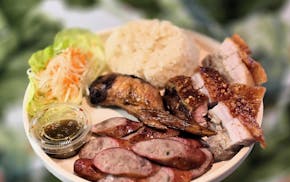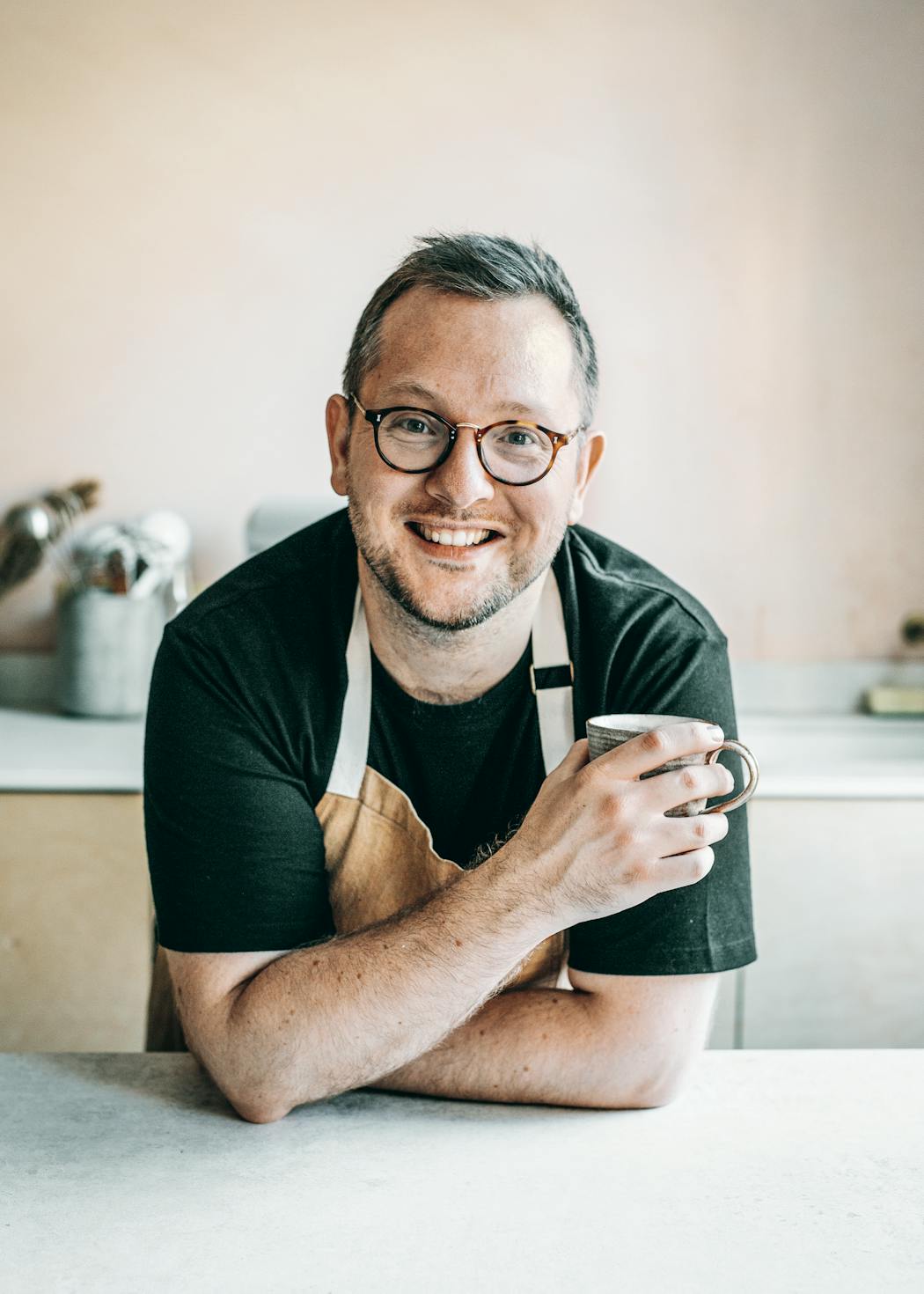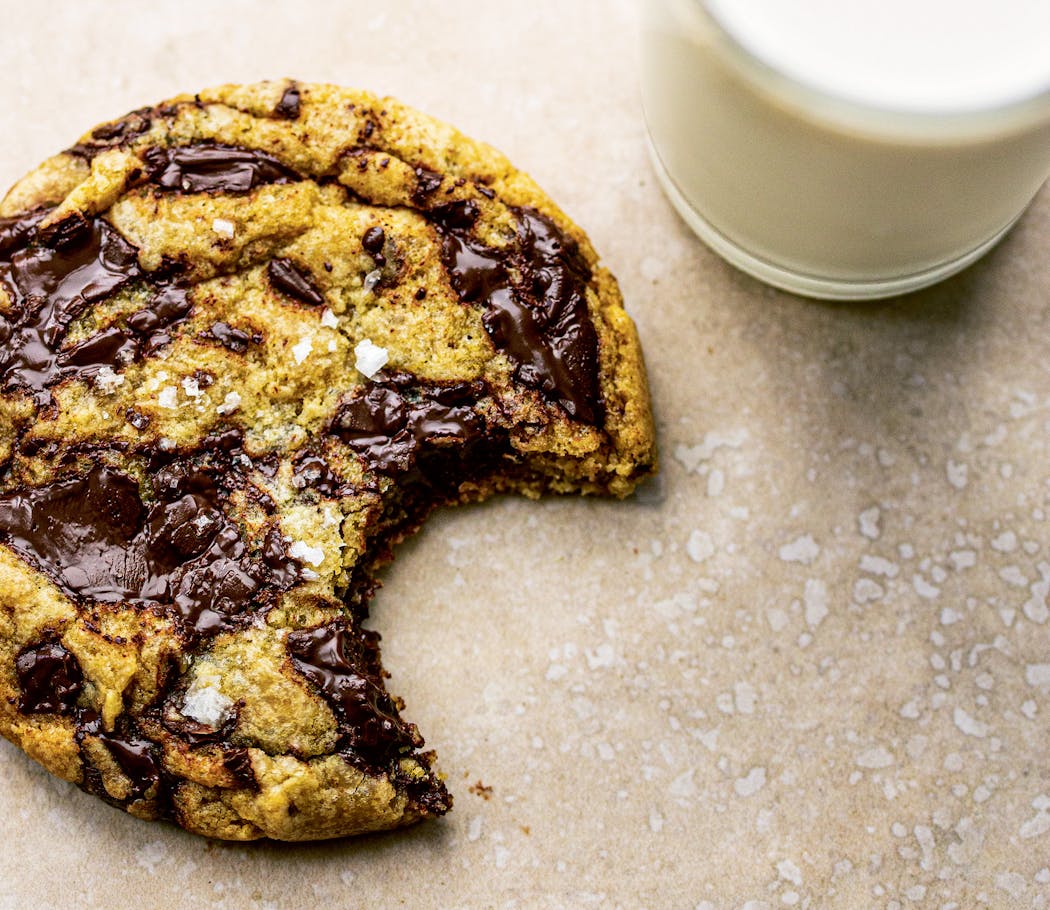London had shut down for a national day of mourning as Queen Elizabeth's casket made its way through the city toward its final resting place at Windsor Castle. And Edd Kimber was, naturally, thinking about baking.
"It's a weird day today," said Kimber, a Londoner and winner of the first "The Great British Bake Off" in 2010.
The author of six cookbooks, Kimber's latest, "Small Batch Bakes" (Kyle, $23), scales down recipes for one, two or a few eaters. It was born from lockdown, when Kimber sought the comfort of baking. But because of stay-at-home orders, he didn't have anyone besides his husband with whom to share his sweet and buttery treats.
There are recipes that yield six hand pies, four doughnuts, a big bowl of date-night crème brûlée for two, and one "emergency" chocolate chip cookie.
During those long days at home, as Kimber experimented with downsizing classic recipes, he noticed that his followers — he has 400,000 on Instagram — were wanting the same thing. Whether they were looking to cut back on kitchen waste, getting by on a tight budget or watching their cookie dough intake, what united them was that at a grave moment in history, they still wanted to bake.
There was a similar response last month when Queen Elizabeth II died, and London was at a standstill during the events leading up to her memorial service. "I've been baking a lot this week, but that's mainly because there's been nothing else to do," Kimber said. "The world in the U.K., especially in London, feels like it's stopped a little bit."
On the day of the queen's funeral, Kimber, 36, talked about the difference between cooking competitions in the U.K. and the U.S., which country makes better scones and why, when times are hard, people always turn to the kitchen for comfort.
The interview has been condensed for length and clarity.
Q: This book really came out of lockdown for you.
A: It was kind of a happy accident in some ways, because the idea of small-batch baking has been slowly growing as a trend, but it wasn't something I necessarily paid huge amounts of attention to. And then over lockdown, I was just naturally doing it more and more because it was just the two of us, and also my audience was asking for small-batch recipes more and more. And so it felt like a very natural time to dig down into it and see what it was about.
Q: I mean, if ever there was a time for an emergency cookie, it would be lockdown.
A: I've talked about the idea of an emergency cookie for years. That was the first idea for the book. And one of the ones that took a bit of testing to figure out how to make it so it literally made one cookie, but that cookie was still really, really good.
Q: That seems like the kind of recipe everyone should have in their back pocket. How many bad decisions come out of just wanting one cookie?
A: Exactly. And it's one of those recipes that's so easy. Once you have made it maybe once, maybe twice, you'll probably remember it. I am ready to make a cookie at any moment's notice.
Q: Why do you think baking is something that people turned to during the pandemic, or in general during times of stress or sadness? How does baking help with coping?
A: I really think it has a lot to do with the environment around us. I think my generation feels like we are living through one disaster after another. The first moment in my memory, at least the first massive turn towards baking, was the very large financial crash [in 2008]. Whenever those moments come, whether it be lockdowns at COVID or recession or any of those kinds of emotive stressful moments, I think baking is kind of a luxury that's affordable. It's absolutely delicious. It doesn't cost the Earth. If you've got kids, it's a great thing to do with them. And at the end of it, you get something delicious.
I also think cooking is something we have to do for survival. Baking is not that; baking is only ever a pleasurable thing. It's never about necessity. But it does also feed us. There's something very intrinsic in it being a comfort and a pleasure. I think it can really be a stress relief. It can be something fun and entertaining. It can be that thing where it's absolutely pouring down with rain outside and all you want is a little bit of comfort. And there are so many ways of doing that through baking. I think it's such an easy thing to attend to in those moments.
Q: What are some recipes in your book that align with that more traditional British baking?
A: I would say the most traditional will be the crumpets because it is such a classical British thing. But my baking tends to draw inspiration from all over the world. I do like to play with nostalgia. So there are things that are inspired by childhood, but you wouldn't automatically think of them as incredibly stereotypically British.
Q: I like the mix of recipes. There are a lot of nods to American baking and I love how you describe an American biscuit as kind of a cross between Irish soda bread and a scone.
A: Americans, whenever you talk about scones, they assume they're very, very dry. And that's because I think often Americans scones, especially mass-manufactured scones, are so dry that they kind of dismiss them. But if you ask Americans about biscuits, they love biscuits. Well, yeah, a good scone is very similar to a biscuit. But I obviously have to say that British scones are superior. I'm not sure it's actually true, but I have to defend the scones.
Q: What about the challenges of small-batch baking? One thing I noticed is that when everything is smaller, there are some awkward measurements.
A: It was definitely a challenge, but not necessarily in the amounts. It was more about things just working. Breads were very easy to scale down, but it was often about using the right language in terms of measuring things like yeast, for example. In the U.K., our yeast comes in packets, which are 7 grams, and it's annoying to have to buy those if you're only going to use a quarter of it for a recipe. So it was about saying there are other options about how you buy certain products, which are more appropriate for someone who does want to bake them this way but not have loads of waste.
The single cookie recipe, for example, normally would have egg in there, but I did not want to use a quarter of an egg because it's thoroughly, thoroughly pointless. My rule was I could either use whole eggs, egg yolks or egg whites, but I could not beat up an egg and give you a small amount of it. So I had to figure out how to do without them. I realized that by replacing the egg with milk and upping the flour, just a tiny amount, it gave a great texture.
Q: What do you think of the cooking and baking scene in the U.S., especially on TV? When you won "Bake Off," we didn't even have it here for another five years. And when it became a craze here, people were stunned that there could be a competition that was so friendly and gentle.
A: I always found American cooking reality shows very, very competitive and — not aggressive, but there is a quite a determined competitive nature that is in some British shows, too. The thing I've always loved about "Bake Off" is its camaraderie, its friendship and its geniality. And I do think that's why the British loved it, because it was very opposite to some of the reality shows that we were seeing at the time. like singing shows or competitions, where instead of it being about competitiveness, it was about laughing at people who weren't very good, and that was really sad to me. I would never have done a reality show where I felt like if I wasn't good, I would be made fun of. And I think people in the U.K. loved it because it was the antithesis of that. Whereas in America I think they loved it because of the Britishness of it. The kind of friendliness of it was so different to their food shows.
I do find it quite difficult to watch American shows because they're so competitive. And I know that's not the case when it comes to the actual baking community in America. I'm very lucky to spend time in bakeries all over the country and I've met many, many bakers. And the thing I find around the world is that bakers are very supportive of one another. They're very good at sharing knowledge and advice and helping. That is the reality that I think is out there.
See Edd Kimber in the Twin Cities
When: Oct. 8, noon-4 p.m.
Where: Williams-Sonoma, 3512 Galleria, Edina.
What: Kimber will demonstrate a recipe from his book "Small Batch Bakes," using Nordic Ware, pass out samples and sign books.
More info: Learn more about Kimber at his website, theboywhobakes.co.uk. "Small Batch Bakes" was released Oct. 4 and is widely available in bookstores and online.
Emergency Chocolate Chip Cookie
Serves 1.
"There are times when absolutely nothing but a warm chocolate chip cookie will hit the spot," Edd Kimber writes in "Small Batch Bakes" (Kyle, $23). We couldn't agree more. His recipe employs pantry staples to satisfy the strongest craving with a single-serving cookie in only about 20 minutes. Using it as a springboard, we boosted the texture and flavor with three kinds of sugar and two kinds of chocolate, and added a splash of vanilla and a touch of malted milk powder to give it more depth. Then we froze the dough briefly before baking, for added chewiness. The beauty of this recipe-for-one, once you've internalized it, is that the only tastes you need to consider are your own.
• 1 tbsp. unsalted butter, melted and slightly cooled
• 1 1/2 tsp. light brown sugar
• 1 1/2 tsp. dark brown sugar
• 1 1/2 tsp. superfine or granulated sugar
• 1 1/2 tsp. malted milk powder
• 1 1/2 tsp. whole milk
• Splash of vanilla
• 3 tbsp. all-purpose flour
• Pinch kosher salt
• Pinch baking powder
• Pinch baking soda
• 2 tbsp. roughly chopped chocolate, mix of dark and milk chocolate, plus more for topping
• Flaky sea salt, for sprinkling, optional
Directions
Preheat oven to 350 degrees. Line a baking sheet with parchment paper and spray paper with cooking spray or grease with butter.
In a small bowl, combine butter, sugars and malt powder and mix together using a spatula. Pour in the milk and vanilla and mix until creamy. Add the flour, salt, baking powder and baking soda and mix until a dough forms. Add the chocolate and stir to combine.
Form the dough into a ball and place on the prepared baking sheet. Press down slightly to flatten to the width of a baseball. Top with a few more pieces of chopped chocolate and a sprinkling of flaky sea salt, if using. Place baking sheet in freezer for 5 to 10 minutes, until well chilled. Remove from freezer and bake for 16 to 20 minutes, or until golden around the edges. Set aside to cool. The cookie is best eaten on the day it's made.

Critics' picks: The 11 best things to hear, do and see in the Twin Cities this week

Critics' picks: The 9 best things to do and see in the Twin Cities this week

The 5 best things our food writers ate this week

The 5 best things our food writers ate this week





